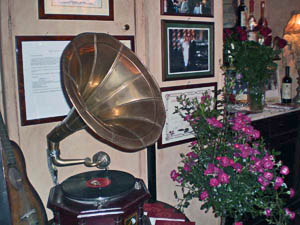2. F. Scott Fitzgerald and the Jazz Age
---------------------------------------
Previous - Next - Contents
Coming Home : by Michael Furtner
Last night (October 25, 2008) I recorded Por qué, a Jazz waltz I wrote in
2002. That brings the total number of my online recordings to 10. I
will probably do more of them once I am settled in at the Sunshine
Coast next month.
 I watched some TV, went to bed but could not get to sleep, so I kept
reading F. Scott Fitzgerald's book 'Tender is the Night'. I
really find it a fascinating read. His style of expression is so
totally different and unique, it sets (in my mind) him and Ernest
Hemingway apart as the two most innovative modern writers of the
20th Century.
I watched some TV, went to bed but could not get to sleep, so I kept
reading F. Scott Fitzgerald's book 'Tender is the Night'. I
really find it a fascinating read. His style of expression is so
totally different and unique, it sets (in my mind) him and Ernest
Hemingway apart as the two most innovative modern writers of the
20th Century.
His way of expressing, describing and associating events, people,
places, situation, etc. fluctuates between impressionistic and
downright surrealistic. You need to read rather slowly and
think through what he writes in order to absorb the true picture.
Let me give you a couple of small cameo descriptions of his so that
you get some idea of his style.
The two main characters of the
book, Dick and Nicole, are listening to some old records (Nicole's
sister has sent from America) on a portable phonograph one evening in
a garden in Switzerland :
The thin tunes, holding lost times and future hopes in
liaison, twisted upon the Swiss night. In the lulls of the phonograph
a cricket held the scene together with a single note
......... |
Here is how Dick feels about Nicole :
He (Dick) was enough older than Nicole to take
pleasure in her youthful vanities and delights, the way she paused
fractionally in front of the hall mirror on leaving the restaurant, so
that the incorruptible quicksilver could give her back to herself.
He delighted in her stretching out her hands to new octaves now
that she found herself beautiful and rich.
|
Fitzgerald (reputedly) gave a name to the age he
lived in : the Jazz Age. How appropriate, because one could
describe his writing too as creative, unique improvisations over known
and existing chord progressions (the world we know and live in).
Next Page -
Top of Page
Copyright © 2010 Michael Furstner
|
 I watched some TV, went to bed but could not get to sleep, so I kept
reading F. Scott Fitzgerald's book 'Tender is the Night'. I
really find it a fascinating read. His style of expression is so
totally different and unique, it sets (in my mind) him and Ernest
Hemingway apart as the two most innovative modern writers of the
20th Century.
I watched some TV, went to bed but could not get to sleep, so I kept
reading F. Scott Fitzgerald's book 'Tender is the Night'. I
really find it a fascinating read. His style of expression is so
totally different and unique, it sets (in my mind) him and Ernest
Hemingway apart as the two most innovative modern writers of the
20th Century.